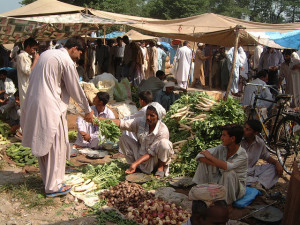 MOTIVATION
MOTIVATION
Responding to a request from the government of Pakistan, the Pakistan Strategy Support Program (PSSP) was launched in July 2011. This program is a flexible country-led and country-wide policy analysis and capacity strengthening program, which provides analytical support on a range of economic policies affecting agricultural growth and food security in the country. The core purpose of the program is to contribute to pro-poor economic growth and enhanced food security through a strengthened national capacity for designing and implementing evidence-based policy reforms. This requires improving research-based policy analysis; building capacity, leadership, and networks among researchers and policy analysts within and outside the government; and disseminating research results among diverse stakeholders.
PSSP’s five primary research and capacity-building priorities include (1) agricultural production and productivity; (2) water management and irrigation; (3) macroeconomics, markets, and trade; (4) poverty reduction and job creation; and (5) the Competitive Grants Program (CGP).
ONGOING WORK AND OUTCOMES
- PSSP’s efforts influenced the government of Pakistan to review and modify the Consumer Price Index (CPI). Having an accurate CPI is critical for all government policy work pertaining to exchange rate and fiscal and wage policy.
- PSSP analysis has shown that the current national poverty line methodology overestimates success in poverty reduction in Pakistan in general and substantially underestimates poverty in some provinces relative to the national figures (PSSP Working Papers 20 and 26).
- In Pakistan, urea production has historically been subsidized, to a large extent, by the government through its regulation of natural gas prices for urea manufacturers and its imports of fertilizer at subsidized rates. IFPRI’s study on Pakistan’s fertilizer sector examined the effects of this subsidy and found that it leads to a loss of many billions of dollars of government revenues and hastens the decline in scarce domestic natural gas reserves. The same research also indicated that phosphorus fertilizer used in wheat production is inefficient. The most recent government package of support for agriculture encouraged a more efficient use of fertilizer, partly as a result of the assessment done in this IFPRI research.
- Water scarcity is increasingly affecting food security in Pakistan and is expected to further worsen as climate-related crises and changes become more frequent. As a result, food import needs for basic staple crops are expected to grow. IFPRI, under the PSSP, implemented a series of studies to identify measures to better manage the growing water scarcity. Researchers found that access to energy-intensive groundwater does not necessarily increase the technical efficiency of agricultural production. They also found that further efficiency improvements in surface systems are necessary to address energy use for groundwater pumping. Efficiency improvements in surface water systems can be achieved through strengthening water-user associations, which have been shown to increase agricultural productivity. PSSP also provided ample, evidence-based policy analysis to support the finalization of the National Water Policy.
For more on the outcomes of IFPRI's work in Pakistan, go to the booklet.


